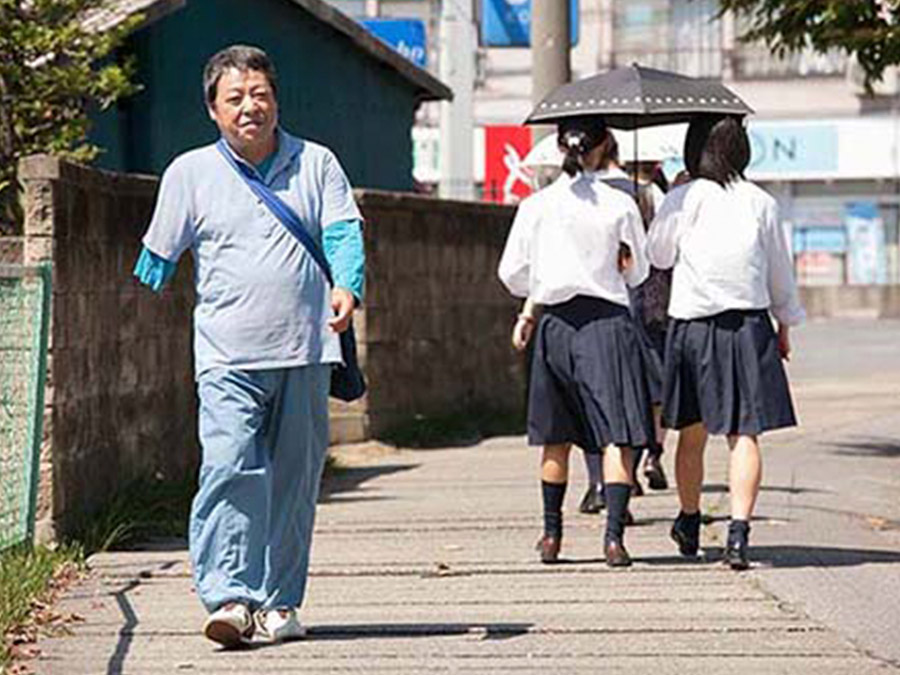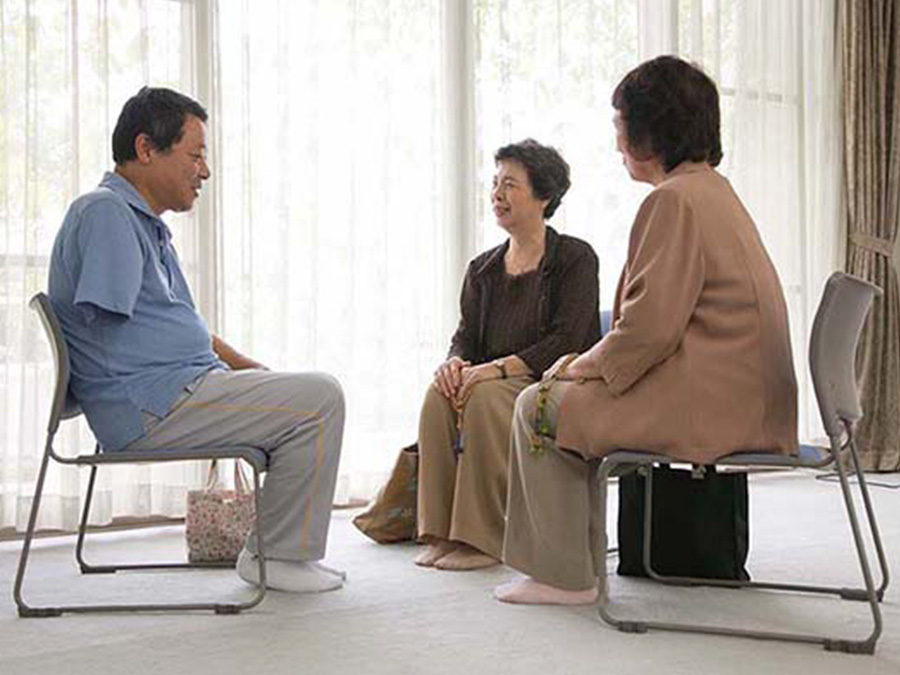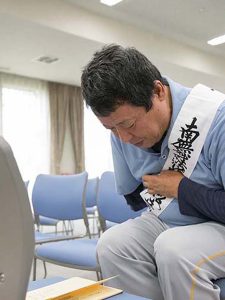Mr. Hideyuki Yagawa
Losing an arm
The hands of the factory’s wall clock had almost reached 5. Looking at the clock, Hideyuki Yagawa (61) thought about making dinner for his elderly mother, Hana (95), who was waiting at home. Just at that moment, Hideyuki’s right arm became completely caught under a pressing machine for cutting out iron plates.
Hideyuki’s screams were drowned out by the resounding din of the factory’s machinery. The factory director, who had seen the emergency, took Mr. Yagawa in his arms, and laid him down at the side of the machine. To, Mr. Yagawa, it seemed to take a very long time for the ambulance to arrive.
How much time had actually passed? When paramedics got there, they tied the arm with bandages and stopped the bleeding. Then Hideyuki was sent to a well-equipped hospital about an hour’s distance from the factory. On the way to the hospital, despite measures to control the bleeding, he heard the sound of blood dripping on the floor from his arm.
“Am I dying?”–the thought struck him for a moment in a wave of severe pain and confusion.
Then, after major surgery lasting seven hours, Mr. Yagawa’s right arm was amputated at the shoulder. It was December 5, 2008, as the winter was growing colder.
Mr. Yagawa was born as eldest son of four siblings of in small farmhouse in Tsubame City, Niigata Prefecture. After he graduated high school, he got a job at a company’s service office in Tokyo and became a salesperson. At the age of 35, he married Chizuru (now 57), and they were blessed with two children. He had been enjoying a peaceful family life in Kasukabe City, Saitama Prefecture, north of Tokyo. However, when he was forty-eight years old, in order to take care of his aged mother, he had to quit his job at the company where he had worked so far and begin to live in Niigata, leaving his family in Kasukabe.
His wife was willing to see him off, saying that there was no reason to oppose a man showing devotion to his mother. But taking care of his mother and working his new job made him too busy to either physically or mentally relax, even for a moment. The pressing machine accident happened after he had been living this way for seven years.
As the third day dawned, Hideyuki awoke from deep sleep under anesthesia post-operation. The cut edge of his amputated upper arm became swollen. Severe pain pulsated through the area repeatedly. But what was stronger was the sense of regret and repentance he felt toward his parents; he had allowed the body they had given him to be hurt, and that caused him much emotional pain.
The pain of the wound
After about half a year stay in the hospital, early in May of the following year Mr. Yagawa was temporarily discharged and returned home in Kasukabe City, Saitama Prefecture. But his life without his right arm and two fingers of his left hand was much harder than expected. There were several things he could not do well, including not only dining but also elimination, wearing clothes, and even answering the phone. Sometimes, as he became irritated because he could not do as he liked, or felt anxiety about his life in the future, he suddenly got depressed. He frequently groaned in his sleep.
Mr. Yagawa felt conflicted as he wondered what purpose his life served in the world. His wife took care of him and was able to read his emotions. For example, his wife made a suggestion: “Honey, I found a meeting place for Japanese chess in front of the station and checked the time schedule. Why don’t you go there?”
However, what was most painful to Mr. Yagawa was phantom limb pain, which is experienced by most patients who undergo amputation caused by injury or disease. It is said that the pain is as severe as having burning charcoal pushed against one’s skin. Mr. Yagawa consulted with a doctor, and the doctor told him that the pain would be permanent. He then thought that he may as well get used to the pain. In order to coexist with the pain, he decided to take a walk early in the morning and late at night so that he could be exposed himself to cold air, which actually made the pain more intense. When he began to walk in the town each day, he could not help feeling passers-by were looking at his body out of curiosity. Even so, he could find a little happiness in his walks. He felt affection toward flowers along the way, which changed day by day, and barking dogs. Hideyuki says these things compelled him to take his daily walks.
Then, while walking, he spotted a sign with the words “The Gift of Life, The Power to Live”—which would later lead him to start his new life.
“The Gift of Life, The Power to Live.” When he saw these words on the outside wall of Rissho Kosei-kai’s Kasukabe Dharma Center, he felt the strong urge to know what these words meant.
After hesitating for a few days, Mr. Yagawa made up his mind to ask a man standing at the gate of the Dharma center whether anyone could enter. “Yes, please, please come in,” said the man, guiding Mr. Yagawa into the center. Mr. Yagawa felt inexpressible emotions that he had never experienced. He said he felt so comfortable that he it made him nostaligic–as if a child getting out of a bath were rushing into a well-washed towel held by the mother at the changing area of the bathroom.
From that time on, the Kasukabe Dharma Center became a part of Mr. Yagawa’s walking course. About a month later, he dared to ask Rev. Kimie Tamaki, then minister, about the meaning of “The Gift of Life, The Power to Live,” which had stuck in his mind from the beginning. Then, Rev. Tamaki responded by asking Hideyuki what he thought of the words.
Mr.Yagawa, who had barely escaped death, said honestly, “I can realize ‘The Gift of Life.’ My heart pulses without cease and without my having to will to do so. But . . . I can’t imagine ‘The Power to Live.’” After thinking a little while, Rev. Tamaki answered, “‘The Power to Live’ can be replaced to ‘power to seek.’”
“‘The power to seek’–what am I seeking?” Mr. Yagawa repeated Rev. Tamaki’s words in his mind over and over.
Lots of impressions
About a year had passed since Mr. Yagawa had the accident, and three months had passed since he encountered Rissho Kosei-kai. He was not yet a member of Rissho Kosei-kai at the time, but he came to visit the Dharma center on a daily basis. One day, as he walked in the entrance as usual, Mr. Katsuyoshi Fukuda (65), head of the Men’s Group of the Dharma center, was at the receptionist desk. Mr Fukuda said, “Mr. Yagawa, if you become a member of Rishho Kosei-kai, you can see the Buddha.”
Surprised by the sudden offer, Mr. Yagawa replied to Mr. Fukuda, saying, “Really? Can I see the Buddha?” Mr. Fukuda answered in the affirmative. Hearing his words, Mr. Yagawa paid one hundred yen for a membership fee on the spot and became a member of the Sangha of Rissho Kosei-kai. It was simply because he wished to see the Buddha.

“The Gift of Life: The Power to Live”—which led Hideyuki to a new life.
But after a week or two had passed, the Buddha had not appeared in the front of Mr. Yagawa. He felt doubt coming on and again asked Mr. Fukuda, saying, “When can I see the Buddha?” Mr. Fukuda said to him, “You can see the Buddha if you practice more.” But he was wondering if it was all a hoax.
Just at that time, Mr. Yagawa volunteered to serve as traffic control and started to be become diligent in the practice.
First, people with the assignment of the traffic control stand at the gate of the Dharma center and, with palms together, welcome those who come to visit for worship. But Mr. Yagawa had lost his one arm, and could not put his palms together. Even so, he strived to exchange greetings with his one arm held tightly to his chest.
Then, gradually, he began to encounter the kind of people he had never experienced. Shifting his eyes to the corner of the garden, he saw someone gently pouring water in the flowerbed, being careful not to scatter the blossom petals, and he also saw another quietly cleaning a place where no one was watching. And for Mr. Yagawa himself, whenever he saw such members’ behavior, he was tremendously moved, and felt warmth swelling in his heart. He was moved to tears.
Especially, the sight of an elder man mopping silently around the entrance with no one’s appointment burned into Mr. Yagawa’s mind.
“Why does he make such an effort to silently keep the place clean? If only I had both my arms. . . . I would like to mop with him someday.”
However, he had lost his right arm, and only the middle, third, and little fingers of the left hand remained. He could not hold either a mop or a broom, and could not even wring out a rag. He recognized the reality of his situation, but the strong aspiration had arisen in his mind–“I wish to clean somehow.” When Mr. Yagawa told his doctor about his wish, at first the doctor looked confused. But finally the doctor was overwhelmed by Mr. Yagawa’s strong will, and later, the doctor set up a team of specialists to work on Mr. Yagawa. The team performed transplant surgery on him to create a thumb from part of his pelvis. Several painful transplant procedures were performed, but on his left hand, doctors formed an irregularity like fingers was formed, and this enabled him to push out and draw back a mop.
So during his two-month stay in the hospital, Mr. Yagawa worked hard at his rehabilitation, wishing to mop as soon as possible. As soon as he left the hospital, he went off to the Dharma center and together mopped with the man he had previously observed.
Working alongside the man who was alone mopping silently as usual, Mr. Yagawa mopped silently in the same quiet manner.
Obviously, it gave him great pleasure that he eventually could do what he had been unable to do. However, as senior members practice it, the act of mopping represents refining one’s own mind and heart. The fact that he could do this himself brought him a lot of joy. When they raised their heads after they finished cleaning, the two men’s faces were wet with tears.
Through the duty of traffic control, Mr. Yagawa cultivated a close relationship with the sangha, and at the same time, he found himself feeling no pain of his arm, and this was so surprising for him.
He remembered the words of Rev. Tamaki once again. “The power to live” is “the power to seek”; he thought what he had been seeking might be the soul-stirring impression he received by seeing the sangha members make untiring efforts to live. The contact with the sangha made him realize that this had been the source of the power to live.
Until this day, even in rainy, windy, or sunny, hot weather, Mr. Yagawa was seen standing in front of the gate at seven thirty, holding a traffic wand with his fingers after he finished the 6 a.m. sutra recitation at the Dharma center.
The existence of the Buddha
About three years had passed since Mr. Yagawa had become a member of Rissho Kosei-kai. As usual, he stood at the gate of the Dharma center at seven thirty in the morning. That day he found a car in front of the entrance to pick up Minister Mitsuyo Kawano at the station. Looking carefully at the person in charge of picking up the minister, he found a woman who looked over eighty years old and was walking unsteadily by herself. He saw her get in the passenger seat.
He thought, “I wonder if she’s all right.” A few minutes later, however, when the car came back, he saw that Rev. Kawano (who had been picked up by the woman) had taken her hand and guided her to the entrance! The moment he saw that scene, he was deeply impressed, thinking, “Both Rev. Kawano and the woman treat each other with respect and strive to assist each other to fulfill their respective duties! In any situation, everyone has the gift of life in the world of the Buddha!”

The sangha makes him recognize “the mind to be impressed.”
Once Mr. Fukuda, head of the Men’s Group of the Dharma center, had taught that Mr. Yagawa could see the Buddha; but Mr. Yagawa imagined that he could see the Buddha with his own eyes like an image on a TV screen. However, he wondered if the image of the Buddha that he had sought for was already in his mind. Pondering this, he was able to see that the impressions in his mind, and the mind that was capable of recognizing them, were the reflections of the Buddha himself. The word “see” which Mr. Fukuda used to refer to was “being sensible of” or “perceive.”
This is Mr. Yagawa’s fifth year since he became a member of Rissho Kosei-kai, and he tried a new practice this summer. That was the activity of guiding members in his chapter to participate in the group pilgrimage to the headquarters by the Men’s Group of the Kasukabe Dharma Center, which was to be held in the Horin-kaku Guest Hall within the headquarters in Tokyo. He became a member of the planning committee of the group pilgrimage.
Wishing to have as many participants from the sangha as possible, Mr. Yagawa visited door to door almost every day and asked for members’ participation. Naturally, some willingly consented to participate and others refused, saying, “I can’t go because of my work” or “I have something planned for that day.” But Mr. Yagawa devoted himself to communicating with members, respecting each member’s feelings.

“I want to see the Buddha.” This wish gives Hideyuki an energy to do daily practice.
As the day of the event approached, he also called his former colleagues and friends, holding the phone with his inconvenient hand. Seeing his father striving to make untiring efforts to live, Mr. Yagawa’s eldest son said that he would participate in the pilgrimage if he would be allowed to do. It was a few days before the pilgrimage. Once his son said that he was not concerned about his father’s faith, so Mr. Yagawa never expected his son’s participation. In his mind, Mr. Yagawa put palms together in reverence.
When Mr. Yagawa lost his arm, he almost lost sight of the hope for living, the course a person has to walk in life, and his own value as head of his family. But it is different now. Feeling sincerely grateful for having lost his arm and having been disabled, he lives every day with pride.
When he was taking care of his mother, he felt he could not afford to enjoy the beauty of flowers beside the road. He may have once been a father who only had time to talk hastily to his family. But after losing his arm and searching for a new way to walk, he encountered the teachings of the Buddha, and the sangha awoke “the mind to be impressed.” Each of these impressions (in other words, each encounter with the Buddha), became his power to live or the source of his vitality.
Furthermore, he said that these awakenings became the basis of his new life, in which he could recognize the depth of his family’s love and bond, the importance of being humble and the mind of gratitude. And now, in a detached and refreshing tone, Mr. Yagawa says, “Once I was resolved to die due to the loss of my arm. But my life has been saved. Cherishing the present moment and this time, I want to brighten my life.”
Perceiving the Buddha in trivial incidents of daily life that we tend to miss–such impressions have become Mr. Yagawa’s power to live.